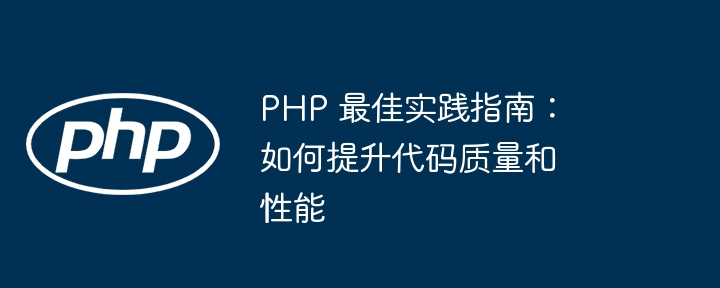
To improve PHP code quality and performance, best practice guidelines recommend: Use namespaces to organize code. Ensure code consistency by following PSR standards. Use type checking to ensure correct data types. Avoid coupling and use interfaces or dependency injection to achieve loose coupling. Use caching to improve code performance. Optimize queries and improve database search efficiency by creating indexes.

PHP Best Practices Guide: Improving Code Quality and Performance
Preface
Maintaining code quality and optimizing performance are critical to the success of any PHP application. Following best practices can help you write maintainable, scalable, and efficient code. This article will introduce PHP best practice guidelines to help you improve code quality and performance.
Using namespaces
Namespaces help you organize your code and avoid name conflicts. By using namespaces, you can easily organize classes, functions, and variables into corresponding categories.
namespace App\Controllers;
class UserController
{
// ...
}Follow PSR standards
The PHP Standard Recommendations (PSR) provide a set of coding style guidelines to ensure code consistency and readability. Following PSR standards can help improve code maintainability and reduce code review time.
// PSR-12 遵守示例
declare(strict_types=1);
function sum(int $a, int $b): int
{
return $a + $b;
}Use type checking
Type checking helps ensure that the input and output data types of your code are correct. This helps you avoid errors while coding and makes your code more robust.
function sum(int $a, int $b): int
{
if (!is_int($a) || !is_int($b)) {
throw new InvalidArgumentException('Arguments must be integers');
}
return $a + $b;
}Avoid coupling
Loosely coupled code is easier to test and maintain. Avoid creating unnecessary dependencies between classes and instead use interfaces or dependency injection to achieve loose coupling.
interface DatabaseInterface
{
public function connect();
public function query($sql);
}
class MySQLDatabase implements DatabaseInterface
{
// ...
}Use cache
Cache can significantly improve the performance of your code. By storing frequently accessed data in the cache, you can reduce database queries and file read operations.
$cache = new Cache();
$cacheKey = 'user_data_' . $userId;
$userData = $cache->get($cacheKey);
if ($userData === null) {
// 从数据库中获取用户数据
$userData = getUserData($userId);
$cache->set($cacheKey, $userData);
}Practical Case: Optimizing Query
Suppose we have a database table containing millions of records and need to find user data by user ID. We can use the following query:
$query = "SELECT * FROM users WHERE id = $userId";
This query can be slow because PHP has to traverse the entire table to find the user data. To optimize queries, we can use indexes:
// 在 users 表上创建 id 索引 ALTER TABLE users ADD INDEX (id); $query = "SELECT * FROM users WHERE id = $userId";
By creating indexes, the database can quickly find user data without traversing the entire table. This can significantly improve query performance.
Conclusion
Following these best practices can help you write high-quality, high-performance PHP code. By following these guidelines, you can improve your application's maintainability, scalability, and efficiency.
The above is the detailed content of PHP Best Practices Guide: How to Improve Code Quality and Performance. For more information, please follow other related articles on the PHP Chinese website!